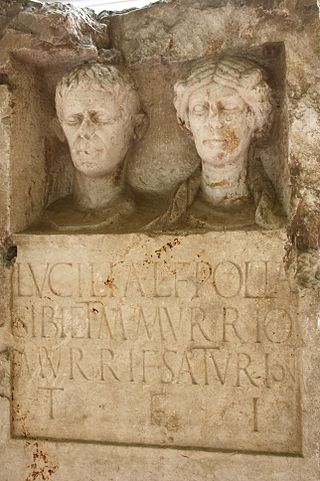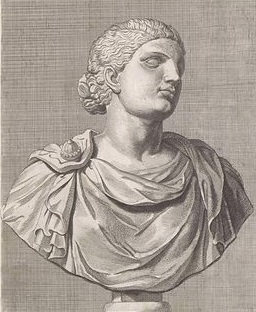Related Research Articles

The gens Lucilia was a plebeian family at ancient Rome. The most famous member of this gens was the poet Gaius Lucilius, who flourished during the latter part of the second century BC. Although many Lucilii appear in Roman history, the only one known to have obtained any of the higher offices of the Roman state was Lucilius Longus, consul suffectus in AD 7.
The gens Pontia was a plebeian family at ancient Rome. Few members of this gens rose to prominence in the time of the Republic, but the Pontii flourished under the Empire, eventually attaining the consulship. Pontius Pilatus, as prefect of Judaea, is known for his role in the execution of Jesus.
The gens Scribonia was a plebeian family of ancient Rome. Members of this gens first appear in history at the time of the Second Punic War, but the first of the Scribonii to obtain the consulship was Gaius Scribonius Curio in 76 BC.

The gens Pompeia was a plebeian family at ancient Rome, first appearing in history during the second century BC, and frequently occupying the highest offices of the Roman state from then until imperial times. The first of the Pompeii to obtain the consulship was Quintus Pompeius in 141 BC, but by far the most illustrious of the gens was Gnaeus Pompeius, surnamed Magnus, a distinguished general under the dictator Sulla, who became a member of the First Triumvirate, together with Caesar and Crassus. After the death of Crassus, the rivalry between Caesar and Pompeius led to the Civil War, one of the defining events of the final years of the Roman Republic.

Calpurnia was either the third or fourth wife of Julius Caesar, and the one to whom he was married at the time of his assassination. According to contemporary sources, she was a good and faithful wife, in spite of her husband's infidelity; and, forewarned of the attempt on his life, she endeavored in vain to prevent his murder.

The gens Marcia, occasionally written Martia, was one of the oldest and noblest houses at ancient Rome. They claimed descent from the second and fourth Roman Kings, and the first of the Marcii appearing in the history of the Republic would seem to have been patrician; but all of the families of the Marcii known in the later Republic were plebeian. The first to obtain the consulship was Gaius Marcius Rutilus in 357 BC, only a few years after the passage of the lex Licinia Sextia opened this office to the plebeians.

The gens Lutatia, occasionally written Luctatia, was a plebeian family of ancient Rome. The first of the gens to obtain the consulship was Gaius Lutatius Catulus in 242 BC, the final year of the First Punic War. Orosius mentions their burial place, the sepulchrum Lutatiorum, which lay beyond the Tiber.
The gens Afrania was a plebeian family at Rome, which is first mentioned in the second century BC. The first member of this gens to achieve prominence was Gaius Afranius Stellio, who became praetor in 185 BC.

The gens Mucia was an ancient and noble patrician house at ancient Rome. The gens is first mentioned at the earliest period of the Republic, but in later times the family was known primarily by its plebeian branches.

The gens Antistia, sometimes written Antestia on coins, was a plebeian family at ancient Rome. The first of the gens to achieve prominence was Sextus Antistius, tribune of the plebs in 422 BC.
The gens Caesetia was a minor plebeian family at ancient Rome. It is known from a small number of individuals living during the late Republic.
The gens Titia was a plebeian family at ancient Rome. The gens is rarely mentioned in the Republican period, and did not rise out of obscurity till a very late time. None of its members obtained the consulship under the Republic, and the first person of the name who held this office was Marcus Titius in BC 31.

The gens Pomponia was a plebeian family at ancient Rome. Its members appear throughout the history of the Roman Republic, and into imperial times. The first of the gens to achieve prominence was Marcus Pomponius, tribune of the plebs in 449 BC; the first who obtained the consulship was Manius Pomponius Matho in 233 BC.
Tiberius Canutius or Cannutius was tribune of the plebs in 44 BC, the year of Caesar's assassination. As a supporter of the senatorial party, he opposed the triumvirs, resorting to military force during the Perusine War. He was captured and put to death by Octavianus in 40 BC.
The gens Cestia was a plebeian family at ancient Rome during the later Republic, and in imperial times. The first member of the gens to obtain the consulship was Gaius Cestius Gallus in AD 35. The family's name is commemorated on two monuments, the Pons Cestius and the Pyramid of Cestius which survive into modern times.
The gens Domitia was a plebeian family at ancient Rome. The first of the gens to achieve prominence was Gnaeus Domitius Calvinus, consul in 332 BC. His son, Gnaeus Domitius Calvinus Maximus, was consul in 283, and the first plebeian censor. The family produced several distinguished generals, and towards the end of the Republic, the Domitii were looked upon as one of the most illustrious gentes.
The gens Fannia was a plebeian family at ancient Rome, which first appears in history during the second century BC. The first member of this gens to attain the consulship was Gaius Fannius Strabo, in 161 BC.

The gens Labiena was a plebeian family at Rome. Members of this gens are first mentioned during the final century of the Republic.
The gens Laelia was a plebeian family at Rome. The first of the gens to obtain the consulship was Gaius Laelius in 190 BC.

The gens Munatia was a plebeian family at Rome. Members of this gens are first mentioned during the second century BC, but they did not obtain any of the higher offices of the Roman state until imperial times.
References
- ↑ Dictionary of Greek and Roman Biography and Mythology, vol. II, pp. 36, 967 ("Epidius", "C. Epidius Marullus").
- 1 2 Suetonius, De Claris Rhetoribus, 4.
- ↑ Dictionary of Greek and Roman Biography and Mythology, vol. II, p. 36 ("Epidius").
- ↑ Cassius Dio, Roman History, xliv. 9, 10.
- ↑ Appian, Bellum Civile, ii. 108, 122.
- ↑ Plutarch, "The Life of Caesar", 61.
- ↑ Velleius Paterculus, Compendium of Roman History, ii. 68.
- ↑ Suetonius, "The Life of Caesar", 79, 80.
- ↑ Cicero, Philippicae, xiii. 15.